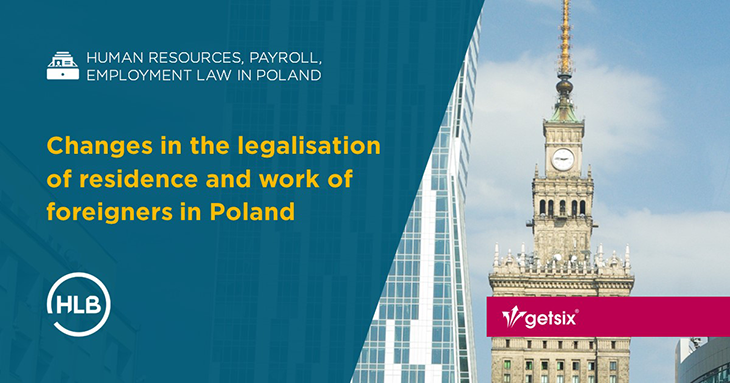Changes in the legalisation of residence and work of foreigners in Poland

We present the key issues concerning modifications in the employment of foreigners and the extension of the legal stay of Ukrainian citizens in Poland. The amendment of the Acts and the planned changes aim to adapt the Polish system to the standards in force in the European Union.
Please note that some of these changes will enter into force as early as this month. As a result, the topic in question acquires particular importance and timeliness for various stakeholders.
Extension of legal stay of Ukrainian Citizens in Poland
The current provisions of the special law on assistance to Ukrainian citizens set out that their stay is legal until 24 August 2023. However, due to alignment with procedures adopted in EU Member States, it was decided to extend the period of foreigners’ stay in Poland. The amendment to the Act on changing the names of state service academies supervised by the minister in charge of internal affairs, amending the Act on the Police, the Act on the Border Guard, the Act on the State Fire Service, and some other acts introduce changes that relate to amendments to the provisions of the special martial law on the legalisation of the stay of foreigners. The legal stay of Ukrainian citizens in Poland will be extended until 4 March 2024.
In addition, the legislation presents additional deadlines for an extended stay in Poland:
- 31 August 2024 for persons who, on 4 March 2024, receive pre-school education, fulfil their compulsory education or study, receive education in a kindergarten or a school functioning in the Ukrainian educational system with the use of methods and techniques of distance education or, no later than in the school year 2022/2023, started education in an industry school of the second degree, post-secondary school or school for adults,
- 30 September 2024 for those who take the baccalaureate examination on a resit date.
The validity periods of national visas, temporary residence permits, and residence cards held by Ukrainian citizens will also be extended until 4 March 2024.
The amendment to the law has already been published in the Journal of Laws and the provisions on the extension of legal residence will enter into force on 27 June 2023.
Law on the employment of foreigners and labour outsourcing
A few months earlier, we informed you about the draft law on the employment of foreigners. Work on the Act has recently accelerated and, although the Act has not yet been referred to the Sejm, it is already raising a lot of questions and doubts.
The most important planned changes are:
- full digitalisation of the procedure for obtaining legalisation documents (access to the proceedings in an electronic system by both employer and the foreigner),
- resignation from the so-called labour market (mayor’s information), expected to contribute to streamlining the procedures for the legalisation of work of foreigners,
- introduction of obligatory prerequisites for refusal to issue a work permit, e.g., in the case when the employer does not fulfil the obligation to pay contributions for social & health insurance, or the Labour Fund.
In addition, the provisions of the draft Act refer to the issue of employee outsourcing (Article 13(1)(7) of the Act). The legislator’s aim is to limit it as disguised temporary work and the planned regulations indicate that it will no longer be possible to obtain a permit in such a case.
The Ministry indicates that it will be possible to obtain a work permit in the case of employment by a temporary employment agency if it concerns a temporary employee. It should be pointed out that the above regulations do not apply to process outsourcing (sale of services). This is because, in such a case, there should be no subordination of employees by those who use the services of the agency. At this point, it is difficult to indicate what the practice of the authorities will look like regarding the distinction between employee and process outsourcing.
Although the regulations have not yet been implemented, the district offices have already stopped issuing permits in the case of identifying grounds for employee outsourcing. Therefore, we currently suggest analysing outsourcing agreements with regard to the issues mentioned.
 Source: The article was created in collaboration with our cooperation partner – sdzlegal Schindhelm Law Office
Source: The article was created in collaboration with our cooperation partner – sdzlegal Schindhelm Law Office
If you have any questions regarding this topic or if you are in need for any additional information – please do not hesitate to contact us:
CUSTOMER RELATIONSHIPS DEPARTMENT

ELŻBIETA
NARON-GROCHALSKA
Head of Customer Relationships
Department / Senior Manager
getsix® Group
***














